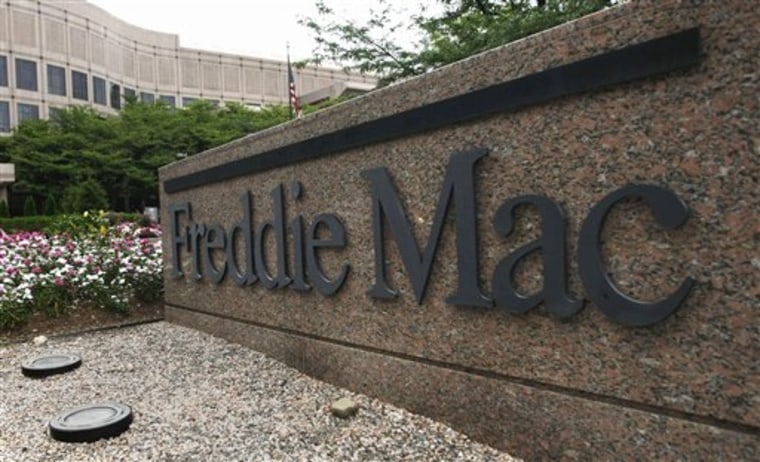Shutting down Fannie Mae and Freddie Mac should fit seamlessly into the Republican drive to shrink government. After all, keeping the ailing mortgage giants afloat has cost taxpayers $150 billion and many in both parties want private lenders to finance a bigger share of the nation's $11.3 trillion residential mortgage market.
But House and Senate Republicans pushing bills to phase out both federally run companies are learning how fear, politics and old-fashioned lobbying can trump ideology.
Even in the GOP-run House, leading proponents of doing away with Fannie and Freddie aren't predicting victory. As a precaution, they're advancing eight bills taking bite-sized swipes at the issue. In the Democratic-led Senate, a sister measure by 2008 presidential candidate Sen. John McCain, R-Ariz., faces long odds, and the Banking Committee's top Democrat and Republican are wary of quickly reshaping the market for financing home purchases.
"There's no consensus on it," House Financial Services Committee Chairman Spencer Bachus, R-Ala., conceded in an interview this month about a sweeping overhaul bill by Rep. Jeb Hensarling, R-Texas. "I can't promise we will build consensus."
Fannie and Freddie don't issue mortgages but buy them from the original lenders, thus providing cash for more loans. They then package many mortgages into securities that they resell to investors, using a government guarantee that lets them pay a lower yield than their few competitors.
Bachus calls Hensarling's bill "the gold standard" for Republicans. It would halt government backing of Fannie and Freddie and end or dramatically reduce their role in mortgage financing within five years. The goal is to turn the mortgage market over to banks and other private lenders, who have shied away during the relentless real estate bust of the past few years.
With housing still staggering from foreclosures and low prices, some Republicans worry that erasing the federal role in the mortgage market could rattle the housing industry and perhaps the entire economy. Without the government guarantee of mortgage products that Fannie and Freddie enjoy, the cost of mortgages would likely rise, making homes less affordable.
"You can't do that," Rep. Gary Miller, R-Calif., a solid conservative and real estate developer from just east of Los Angeles, says of proposals to end the federal role in financing mortgages. "It would devastate the housing market."
Average home prices in the Los Angeles area have dropped 33 percent in five years, three times the national average, according to the Federal Housing Finance Agency.
Feeding lawmakers' concerns are realtors, mortgage bankers and home builders, powerful constituencies and campaign contributors. The bankers and builders brought throngs of members to the Capitol last month to visit legislators, and the realtors are coming in May.
"Every member of Congress has hundreds of them in their district, and they are very active," Rep. John Campbell, R-Calif., another conservative who wants to maintain a federal role in financing homes, said of realtors. "I would not discount their impact."
Though Democrats, including President Barack Obama, agree that Fannie and Freddie should be eased aside to get private lenders back in the market, Republicans generally want to move faster and further.
For many in the GOP, Fannie and Freddie epitomize government waste run amok. Under President George W. Bush, the government took them over in September 2008 as they teetered near collapse as the housing market crumbled. Taxpayers have since shoveled $154 billion at the two companies to keep them alive — which resonates at a time when efforts to trim record budget deficits are a premier national issue.
"The two largest, most influence-exerting, regulation-avoiding, bailed out institutions," Hensarling, a member of the GOP leadership, called them when he introduced his legislation last month. In a brief interview, he said that once Fannie and Freddie are gone, he "absolutely, positively, unequivocally" wants to end the government's role in the mortgage market.
Many Republicans endorse that view, and many lobbyists and congressional aides expect Hensarling's bill to ultimately move through Bachus' Financial Services Committee and the full House. But there are GOP pockets of resistance, chiefly from lawmakers worried about the practical impact of such a move, particularly in districts with high home prices and where the housing market remains especially weak.
Campbell, whose district abuts Miller's and like him is on the Financial Services panel, says the housing market is too crucial to risk destabilizing it.
Asked whether his stance was consistent with his party's philosophy of smaller government, Campbell said, "We're for smaller government and smarter government. We're not for no government and we're not for dumb government."
Working hard against sweeping changes are the National Association of Realtors, the National Association of Home Builders and the Mortgage Bankers Association. While all are major Washington players, the realtors are especially potent: The $3.8 million they donated to more than 500 congressional candidates in the 2010 election was tops among all political action committees, according to the nonpartisan Center for Responsive Politics. So far this year, they've spent another $18 million lobbying.
Vince Malta, a vice president of the realtors, said Republicans trying to end the federal role in mortgages are listening too much to their conservative tea party supporters.
"The move here is political and not based on the reality of what is best for the housing finance system," Malta said.
The Obama administration has offered three options for phasing out Frannie and Freddie, with varying degrees of continued federal involvement, but left subsequent decisions to Congress.
The administration has said it is unilaterally taking steps aimed at reducing the two companies' housing roles and creating room for private lenders to move into the market. They include gradually increasing the fees Fannie and Freddie charge and reducing the size of their loan portfolios.
House Republicans would take similar steps in eight small bills they pushed through a subcommittee this month. They would also go further, cutting the pay of Fannie and Freddie executives to government-level salaries and ending the companies' mandates to back mortgages for lower-income people.
